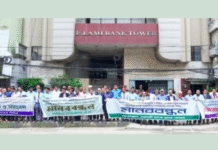Anti-graft body finds call carriers, some BTCL staffs; culprits enjoy blessings of ministers, MPs
An Anti-Corruption Commission enquiry has found that 40 international call carriers had gobbled up money for around 70 percent of incoming calls since 2010 which the BTCL was supposed to get.
It also found that the BTCL’s international call minutes had drastically dropped to around 2.50 crore minutes a day from over 5.50 crore minutes a day in early 2009 due to international calls bypassing proper channels.
The call carriers were hired mostly on the basis of recommendations by some ministers, parliamentary standing committee men and lawmakers.
The BTCL did not follow its rules and regulations in awarding the contracts to these 40 call carriers between late 2009 and 2011, ACC sources said.
The carriers were appointed to improve the BTCL’s international call quality.
The job of the call carriers is to aggregate calls, mostly from Saudi Arabia, Malaysia, the United Arab Emirates and Singapore where many expats live.
The carriers rent STM1 lines from BTCL, which connects Bangladesh to other countries, and transfer incoming international calls to BTCL. These carriers also convert incoming internet protocol calls (VoIP) to traditional calls using a machine, said experts.
The carriers are paid by other international carriers for carrying their calls to BTCL, which eventually connects the recipients of calls, getting a share of that money.
However, an ACC investigator said around 70 percent international call records had been erased from call details recorder (CDR) at BTCL offices in Moghbazar and Mohakhali exchanges in the capital since 2009.
Some CDRs remain traceless, helping call carriers to gobble up money they were supposed to pay BTCL, a state-owned company.
Some BTCL staff and the call carriers were involved in the corruption. The ACC has primarily detected BTCL officials were responsible for erasing call records.
The per-minute call, incoming or outgoing, earns around US 3 cents.
According to a rough estimate, the government is deprived of three crore minutes of revenue worth Tk 7.65 crore every day or a staggering Tk 2,774 crore a year.
An official of the three-member ACC enquiry team said, “In giving permission to the call carriers, the BTCL authorities did not take approval either from the post and telecommunication ministry or from the BTRC [the regulator] which the BTCL board was legally required to do.”
The investigation found that most of the call carriers submitted fake bank guarantees, other required documents and addresses and BTCL did not properly verify those documents.
Sources said the call carriers get post paid facilities upon bank guarantee, but the BTCL never blocked their calls even though they had exceeded their call limits.
BTCL did not properly monitor the incoming calls, but early this year BTCL blocked around 80 carriers for their dues.
But illegal calls continue despite several carriers had been disconnected, sources said.
Md Abubakar Siddique, secretary in-charge of the telecom ministry, told The Daily Star that they would cooperate with the ACC investigation and take departmental action against people found to be involved in the irregularities.
The three-member ACC team has started its enquiry in May this year and on November 5 it sued ex-acting BTCL managing director Abu Sayed Khan and 13 others for misappropriating government revenue of Tk 204.91 crore.
On that date, five cases were filed with Ramna Police Station in the capital against Sayed, five BTCL officers and eight officials of five international call carriers under the Prevention of Corruption Act, 1947.
In the last week of October, the ACC sued three other top officials of BTCL and the managing director of Sabil IT Ltd, an International Gateway operator, in connection with embezzling about Tk 3.27 crore.
The accused are BTCL member Mohammad Tawfiq, directors Mahbubur Rahman and AKM Asaduzzaman, former director (international) Mahafuzur Rahman and MD of Sabil IT AKM Mofidul Islam.
Asked when other people involved would be sued, the officer said they had nearly completed their enquiry and were completing some official procedures to file the cases soon.
Through an ordinance in 2008, the then BTTB (Bangladesh Telegraph and Telephone Board) was split into BTCL. The government had then issued three private international gateways through an open auction. Recently, the government has issued more than 20 private international gateways licences.
Source: The Daily Star










